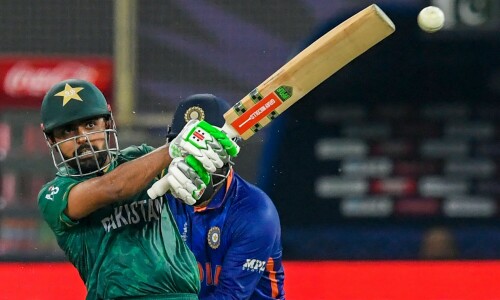HYDERABAD: Former Pakistan skipper Rashid Latif has said that budding cricketers would have to shun negativity and should believe in competitiveness of the game to excel in the game.
He was critical of fact that voices are seldom raised for genuine betterment of cricket since almost everyone attached to the game is either working for the Pakistan Cricket Board (PCB) or the government and such people could never speak up about the harsh realities afflicting the game.
The former Test wicket-keeper was talking to a group of reporters here at the Niaz Stadium after supervising trials at the Karachi Kings’ talent hunt programme on Saturday. The trials would continue on Sunday.
He was unimpressed by the turnout of players in Hyderabad, saying he had expected 500 to 600 players to turn up at the ground for trials.
“The response [in trials] is not like we have in Karachi,” he observed. “Perhaps it is on account of ongoing U-16 tournament and U-19 events where players are busy.”
He was saddened by the state of the Niaz Stadium which he said was handed over to PCB some time ago but was not in a great shape. “There are no facilities and the ground is also not in proper shape,” said Rashid.
He lamented that the governments, past or present ones, as well as the local governments did nothing for the development of the stadium. “In the absence of good grounds where do you think the cricketers will play, he asked and outlined it as a major factor hampering the growth of cricket.”
He added that law and order situation did further damage cricket. “Conditions in Balochistan have not been stable while the cities of Karachi and Hyderabad remained disturbed for a long time and that has affected the game badly,” he said. “But the rest of Sindh has remained peaceful and the players should have come but they have not.”
He observed that Karachi teams did well in the last five to ten years by winning U-13, U-16 and U-19 titles and expressed delight that club cricket is still alive in Karachi. “Selection criteria is however not up to the mark [in PCB] which recently dented Pakistan U-19’s performance,” said Rashid.
He was of the view that the emergence of talented players from other cities of Pakistan had significantly improved and things were different now. “If we talk about the early 1980s era, then it was Lahore and Karachi that used to produce majority of players,” said Rashid. “But when television and satellite system was introduced, more players from other cities and remote areas were also inspired to take up the game. We saw Waqar Younis emerging from Vihari, Yasir Shah from Charsadda and same goes for Aaqib Javed who hails from Sheikhupura or the great Inzamamul Haq from Multan,” he observed. “Today we have so many good players coming from Swabi.
“But unfortunately, we are victims of negativity in this era which must be rectified. Anyone not being selected says he is discriminated against. Nobody is there to tell players how to compete. That is the key.”
Rashid further said that injustices do take place and media must highlight these issues. “Did I introduce two percent quota? It still continues. Did anyone ask government why is it so? But media avoids taking up such issues,” he lamented.
He candidly remarked that schools are not supposed to organise cricket as it is PCB’s job. “But when the government doesn’t ensure equality how can the PCB ensure it, even at the schools level,” he quipped. “Balochistan didn’t get justice in players’ selection, nor did Karachi or the rest of Sindh.”
He said that first-class cricket would have to be given lot of attention as this format of cricket produces players like Sharjeel Khan, Hasan Ali and Shadab Khan.
“Pakistan Super League (PSL) is a fast track version of cricket but it is basically first class cricket in our country which needs attention. “No one really takes up these serious issues in the media at consistent basis,” said Rashid. “We have all sorts of rubbish stuff on TV channels or the glamorous stuff, but hadly anyone is willing to strongly point out the basic faults in our system which are hurting the country.”
Published in Dawn, November 26th, 2017














































